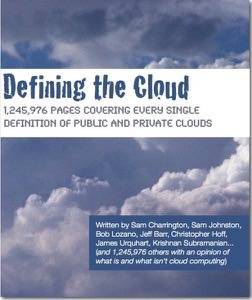
I’ve been involved with computers my whole life, but over the years, I’ve taken multiple sabbaticals from the devices. Upon my return about a year and a half ago, there was a new term being thrown around – “cloud”.
I wasn’t sure what was going on, but everyone was very excited about this “cloud” business. The only thing was, I kept trying to define it by contextual clues and two months later, I had determined that “cloud” was synonymous with “Internet” and “Web.” As time has gone on, however, the term has become more and more muddled, so I’ve decided again to delve into the exact definition of our favorite word – “cloud”.
It wasn’t until I had a long chat at last year’s SXSW with then-Rackspace senior manager of corporate communications Michelle Greer that I understood that “cloud” isn’t simply a replacement for “Internet” or “Web”. It has to do with immediate scalability, virtualization and distributed computing, among other things. Nonetheless, the term seems as muddled as ever.
As Redmond Magazine’s Don Jones pleads argues in an article (wonderfully titled “Please Stop Saying ‘Cloud'”) this morning, the term has long ago lost its way.
I blame the IT marketing sub-industry for this. Let’s start by agreeing to never use the term “cloud” again. They co-opted that term from the telecommunications industry anyway […] What folks routinely refer to as the “cloud” in the IT industry is actually something very different. It’s a huge variety of services and approaches, all of which offer to let you outsource some portion of your IT capabilities – things you might normally handle yourself, in your own datacenter. This is hardly a new concept: I’ve had a “cloud e-mail” address (it ends in yahoo.com) for close to a decade, now. I’ve been using “cloud computing” (a Web hosting service) for just as long.
We took a moment to ask around on Twitter for folks to define “cloud” in 140 characters or less and this is what we got. Some, of course, are tongue in cheek, but that still reflect the state of “cloud” in the public mind.
Then again, this is nothing new, right? Take a look at this wondrous graphic from way back in 2009, as pointed out by @the_spinmd:

So, we have a handful here – what about you? What does “cloud” mean to you? We only have a couple million to go.










